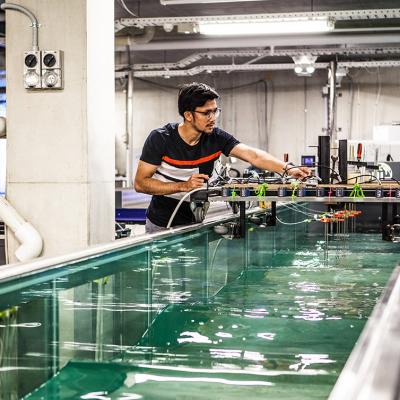Can you get a PhD without a master’s degree? The most straightforward answer is yes. But should you apply to study a PhD without a master’s? Let’s unpack that.
There are quite a few entry requirements you need to meet to apply for a Doctor of Philosophy (PhD). At the core of it, all these requirements are about proving you’re ready to embark on the long (3-4 years full time) and challenging – but incredibly rewarding – process of conducting research and writing a thesis. PhD prerequisites are there to assess your preparedness for this type of study.
So, let’s have a look at what the PhD prerequisites are in Australia and the questions we’re commonly asked about them.
Can I do a PhD without a degree?
In Australia, you’ll need to have completed a degree (undergraduate or postgraduate) relevant to your proposed research topic and approved by the university to be considered as a candidate. However, the good news is, for those of you wondering ‘can you get a PhD without a bachelor’s?’ the answer is yes – it is possible at some universities.
Say you finished high school and went straight into the workforce. You built experience in your field over years of hard work. After a while, you decide that you’d like a qualification to solidify your knowledge and skills, or to upskill in your area and open even more doors. So, you apply for postgraduate studies.
Many universities in Australia will consider applicants for postgrad study (typically graduate certificates) based on proof of extensive professional experience and other post-secondary studies (certificates from TAFE, for example) in a relevant field, rather than the traditional completion of bachelor’s level studies.
Admission into a graduate certificate without a bachelor’s degree is very much dependent on your study area of choice and the institution at which you wish to study. Always check the specific prerequisites of the institution and program.
In most cases, if you want to study a PhD and you don’t have a bachelor’s degree, but you do have a lot of industry and research experience in your field, you’ll need to start your journey by enrolling in a graduate certificate and working your way up to a master’s and then a PhD. It’s possible to get into a PhD program with a graduate diploma (and no bachelor’s or master’s degree), but you’ll need extensive documentation proving former research experience to support your application – plus a decent GPA. This type of application is assessed on a case-by-case basis by some universities and can be extremely competitive.

Do you need a master’s for a PhD?
As we said earlier, no – you don’t need a master’s to apply for a PhD. And if you're wondering more specifically ‘is an MPhil required for a PhD?’, the answer is also no. It may make logical sense at face value to complete a Master of Philosophy (MPhil) and then go on to study a Doctor of Philosophy, but in reality, it tends to work a bit differently.
All these types of postgraduate degrees and higher degrees by research can be a little confusing to keep track of, so let’s break it down into simpler terms.
| Degree | Duration | Delivery |
|---|---|---|
| Master's by coursework | 1-2 years full time | Structured coursework |
| Master of Philosophy (MPhil) | 1.5-2 years full time | Self-directed research |
| Doctor of Philosophy (PhD) | 3-4 years full time | Self-directed research |
So, here’s how some of the pathways through these degrees work.
- Some students decide to study and complete a Master of Philosophy, as it’s shorter than a PhD but still allows them to delve into a research project and produce a thesis (~40,000 words).
- Other students begin studying an MPhil then find they’d like to take their research further and apply to upgrade to a PhD program, adding a few more years onto their studies and producing an 80,000-word thesis.
- Many students aim big from the get-go and apply directly to a PhD program after having completed either a bachelor’s degree with honours or a master’s by coursework.
This is by no means an extensive list of ways in which you can order your studies; it’s just a few of the most common paths taken by university students interested in postgraduate studies and higher degrees by research.
The benefits of studying a master’s before a PhD
Now we’ve established that you can apply to study a Doctor of Philosophy without a master’s degree, let’s address the next big question: should you? Here are just a handful of the reasons why completing a master’s before moving onto a PhD is generally a good idea:
- It gives you a competitive edge compared to other applicants.
- It will provide you with a taste of what it’s like to conduct long-form research and reveal what it takes to be a good PhD student.
- You'll have a chance to explore a research topic to see if there’s enough scope to turn it into your PhD, or you may find offshoot topics that could be explored in more detail.
- You'll experience what it’s like to work with a supervisor and better understand if this process suits your personality type.
Can I go straight from bachelor’s to PhD?
Yes. Most universities will accept applications from students who have a bachelor’s degree with honours (typically at least IIA) as their highest level of completed study. Some universities may accept a bachelor’s degree without honours but with several years of relevant research experience, or a bachelor’s degree without honours but followed by a relevant graduate certificate or graduate diploma.
As we've emphasised above, there are definite benefits to completing further studies after your undergraduate degree to prepare you for your PhD. It’s understandable that you might want to fast-track your way to your Doctor of Philosophy, but remember that going in as prepared as possible will help you get the most out of your research.
If you don’t want to commit to a master’s program after your undergraduate degree but you still have your heart set on a PhD, talk to your course convener about fitting research units into your study plan during your bachelor’s program. Completing a graduate certificate or diploma following your bachelor’s, with a focus on the research area you wish to pursue with a PhD, will help you get a clearer idea of potential research topics too.
There are opportunities for undergraduate and postgraduate students to apply for one of UQ’s summer and winter research programs. These programs can help to boost your knowledge and skills in research and your field of study – and better prepare you for PhD studies.
When considering whether or not to apply for a PhD without a master’s degree, remember that the process is competitive, and it can take time to find the right supervisor. Having a master’s degree could put you ahead of other applicants and secure you that valued place as a PhD candidate.
Want to know more about how a PhD works? How do you find a supervisor? What are the best tips for writing your proposal? Find answers by reading our comprehensive guide: How to get a PhD.





